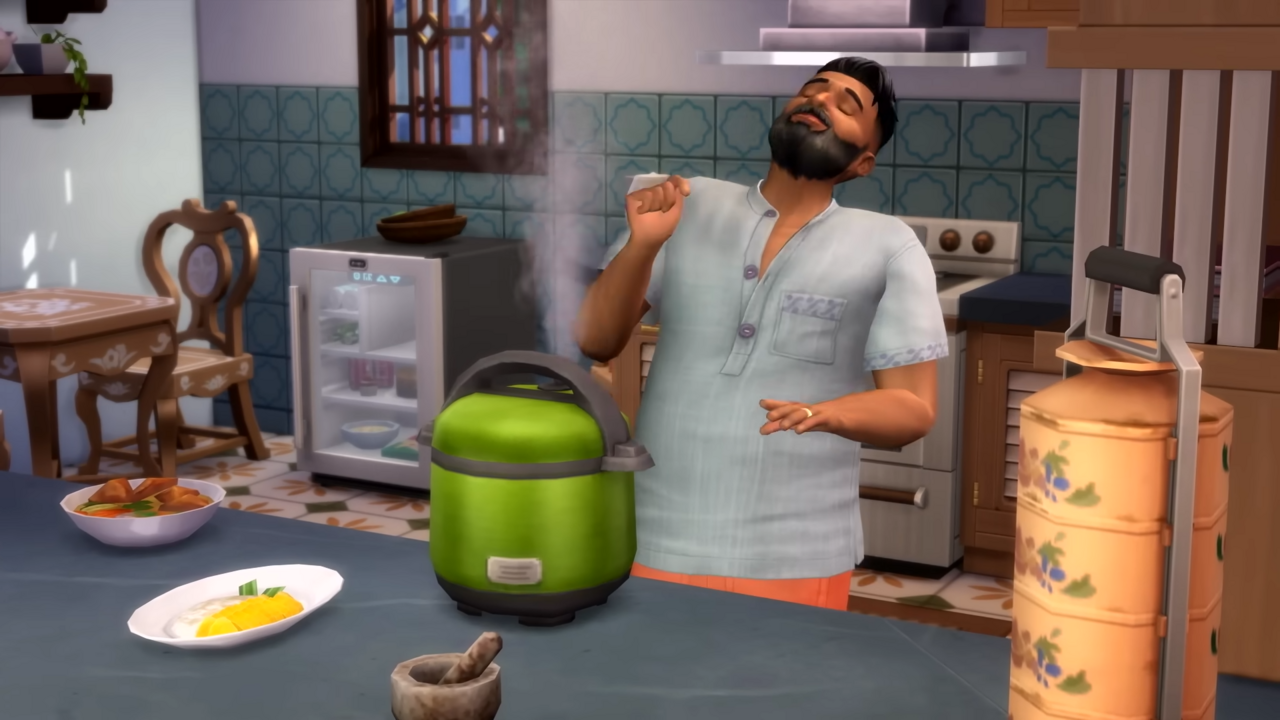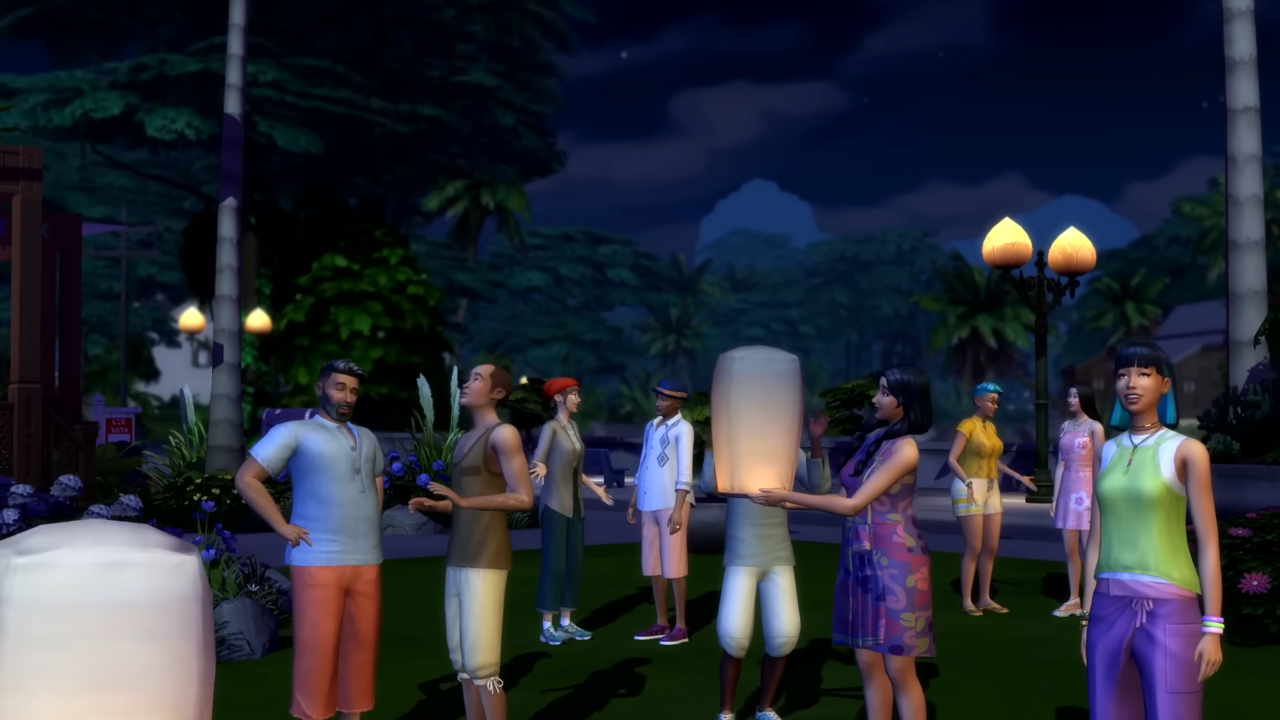The Sims franchise has consistently been one of the most progressive in games. The first entry in the series, The Sims, was among the first video games to ever present same-sex relationships--particularly in a way in which players would play an active role within them. In recent years, The Sims 4 has repeatedly made headlines for its free updates which have included robust gender customization, a greater variety of skin tones, and most recently, the ability to give your sims fully customizable pronouns. However, just as important as large-scale, progressive updates, is the company's dedication to ensuring authenticity throughout the game.
The latest The Sims expansion, For Rent, is no exception. Though its title might sound a bit removed from any one culture, the expansion's accompanying neighborhood of Tomarang draws inspiration from Southeast Asian cities. To help create its bustling night markets and form a meaningful connection between the pack's contents and the culture it seeks to represent, the Sims team brought on musician and activist Jason Chu. GameSpot got the chance to speak with Chu about his work on the pack and how his musical background, world travels, and passion for merging entertainment with authenticity came together to elevate For Rent.

GameSpot: What led to you working with the Sims team on the For Rent expansion? What was the process like?
Chu: My manager connected with this incredible cultural consulting team, SILA Consulting. They've worked with EA before and with the Sims 4 specifically. So when [SILA] heard that they were trying to do this Southeast Asian-inspired world, they reached out to us because they knew my work. And rap and hip-hop music… It's a very different space than The Sims 4. But I think that they saw in my background portfolio and that I have this deep care and passion to get culture right and do representation well while also understanding we're making an entertainment product. We're making something that, hopefully, is not pedantic or dry, but can be fun and engaging.
We came in and they sort of showed me some of the work that had been done and the art assets that they'd started working on. They communicated super clearly to me that their desire was to create something that felt authentic and grounded--not this sort of fantasy or an orientalist, exotic portrayal of these cultures. But what they said to me at the onset was, "Let us know what feels grounded."
They made it clear to me that they wanted to make sure that folks with a background--with a family heritage or even just people who spent time traveling around the world to the countries within that region--that this expansion pack accurately reflects their experiences, their day-to-day lives, and their home cultures. For me, that was just an awesome jumping-off point because it wasn't like we were trying to create something that doesn't exist, but it was more about finding a way to translate the real, the familiar, and the authentic into the design language of The Sims 4.
I think that this idea of cultural consultants is like, "These are the people who come in to scold us and tell us what not to do." And I think that it was such a fun collaboration with this team because it was the opposite of that. Instead of saying, "Hey, here's all of our cool ideas. What's not going to be right? What's going to be too sensitive?" it was the opposite. They brought me in and they said, "Hey, here's some of the directions we're thinking of going. Let's punch it up. Let's add value to it. Let's add value to the players." Instead of saying what can't we do, I was saying how can we make it even more real, even better, even more of a reflection of some of the experiences that they may be having or that they may never get to have and they want to have. To me the highlight of this collaboration was that the team reflected the value added in having cultural competency at the table.
And what were some of the ways that you translated that? I'm sure it's a difficult balancing act, as you don't want it to appear almost monolithic. How do you go about creating that world and balancing that?
We came in and they were already talking about certain features like the night market. You can't have a trip to Southeast Asia without visiting a night market. And that's obviously a really central piece of this new world and this new neighborhood, Tomarang.
They showed me some of the in-progress art assets and I worked with them to source some reference images and also just talk about the energy and the atmosphere--what would feel authentic. [We talked a lot] about making sure that the night market area in the new neighborhood really captures that sort of bustling, crowded feel. Obviously with The Sims 4 game engine, there's only so many characters that can be on screen at one time. So we talked about what some of the pieces--some of the flavor of Thai or other Southeast Asian night markets--that we could incorporate in to make players feel like this world is really populated, and like it's really bustling and busy even if there's a technical cap on how many characters we can have on screen. So there's little flourishes that can make you feel like, "Oh, someone was just here and they just stepped away and here's some of their food," or, "Here's their wares that they left out on a blanket." I'm really excited for folks to take a step into that neighborhood.
Something that I think was really lovingly-crafted also was the style of fuse box [added with the pack]. We talked about details as granular as the kinds of fuse boxes that I'd see in apartments in Southeast Asia and East Asia. We also talked about--obviously--crafting food, as cooking new recipes is a huge part of The Sims 4 appeal. We worked really hard on the list of recipes that would be incorporated in this expansion. And part of that was you can't talk about Southeast Asian food without talking about rice cookers. We actually pulled references of everything from, "Hey, here's what a college kid would have," all the way up to, "Here is the top-of-the-line $2,000 model." That was some of the stuff that, coming in, they sort of pointed me in a direction and then let me bring as much to the table as I could brainstorm. And it was really fun seeing that reflected.

How did your personal culture and musical background factor into your work on the game?
So my family, we're ethnically Chinese. My mom was born and grew up in Malaysia and my dad was born and grew up in Thailand. So I've spent a bit of time traveling around Asia, visiting Thailand. And I think that there's this sort of narrative of [it's either] inclusion, diversity, and authenticity, or mass appeal. You can choose one or the other. And what I loved the most and felt really respected and appreciated by the team for this was the way that they brought me in because they thought that me having this family heritage--me having the personal experiences I have--would add to welcoming players. It would add to the realism and the enjoyment that folks could have in this expansion pack.
There were even times when I would literally be consulting [using] old family photos. Recently, I think a year and a half ago, my dad went back to Thailand to revisit the areas [seen in our family photos]. He brought my sister and they had this three-week trip around Southeast Asia. And he took photos of the areas that he grew up in. And I was literally referencing some of these photos and some from our family archives when they were saying, "Oh hey, here's some textures for the neighborhood. Here's some styles of gates and doors that we're considering letting players use to construct their own dwellings." And I'd literally hold them side by side with these family photos and say, "Oh, cool, maybe if you change this texture a little bit or the shape of this gate, or the shape of this arch changed a little bit, then it would feel even more in line." It was really personal in the end, contributing not only my personal narrative, but my family's cultural heritage and stories, injecting that into this work. And I think what I do as a musician is always trying to take things that are mine and create something out of them that everybody can enjoy no matter how closely or how different we may have experienced the world. And hopefully that comes through with this expansion pack.
Are you already planning on turning around and showing it to your family and being like, "Look at this, you can see bits of us in this?"
I'm super excited. When we were working on this earlier this year, I had no idea when the expansion pack would be released. So the fact that it's going to be out in time for when my partner and I are visiting them this holiday? [I'm] going to have the expansion pack pulled up on Origin and show them like, "Hey, this is some of the stuff I've been up to this year."

I know there's a lot of focus on the night markets, the new city, and making a really lived-in world, but how did For Rent tie in there? How did you weigh in on that and on Southeast Asian culture and the For Rent expansion coming together?
As they were introducing the overall design document and the thesis for this expansion pack, my mind also was like, "Okay, how do these two tie together?" But it makes so much sense to me, being that so much of Southeast Asian, and Asian cultures [value] families living together and having a community beyond the nuclear family. Obviously with the For Rent expansion pack, these multi-unit dwellings that they're working on don't have to all be family. It can be a landlord situation, it can be an Airbnb situation…all kinds of different ways to set this up. But it made sense for me that there's this sort of thematic tie to it. Certainly if you've been to Southeast Asia, you know that you're not going to have very many freestanding houses the way we do here in the suburbs.
When I visit Asia, people live very close to each other. Whether that's kids who will stay living with their family through college, into their twenties up, or until they get married, or as parents age or grandparents as age and move back in with their kids or their grandkids. So for me personally, I just thought the theme makes so much sense having that cultural tie.
And in general, this is--as with so many other cool features in other expansion packs--not tied only to the world of Tamarang and this sort of Southeast Asian-inspired world. Sims from any culture or neighborhood can participate in it and really make it what they want to for their own style of play.
Do you have any additional thoughts on how the For Rent expansion ultimately came together?
I love that the Sims 4 already has such a great history of handling real-life situations with humor and with fun. I think that's why we all play it, because if it was just like real life, we don't need that. I already have a landlord for my apartment, I already pay rent, and I already have to change my light bulbs. But the fact that it's like the real world with this added layer of fun and lightheartedness is I think what makes that piece not stressful, but almost cathartic.

